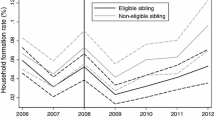Abstract
We examine bequest-sharing rules where sibling rivalry creates wasteful competition for intergenerational transfers. We show that equal division of bequests minimizes rent-seeking expenditures by siblings while primogeniture maximizes rent-seeking costs. Our results lend theoretical support to the empirical findings of equal bequests without appeal to complex models of the parent-child relationship.
Similar content being viewed by others
References
Alston, L., & Schapiro, M. O. (1984). Inheritance laws across colonies: Causes and consequences. Journal of Economic History, 44, 277–287.
Becker, G. (1983). A theory of competition among pressure groups for political influence. Quarterly Journal of Economics, 98, 371–400.
Becker, G., & Tomes, N. (1979). An equilibrium theory of the distribution of income and international mobility. Journal of Political Economy, 87, 1153–1189.
Bernheim, B. D., Schleifer, A., & Summers, L. (1985). The strategic bequest motive. Journal of Political Economy, 93, 1045–1076.
Bernheim, B. D., & Severinov, S. (1999). Bequests as signals: an explanation for the equal division puzzle. Working paper, Stanford University.
Bruce, N., & Waldman, M. (1990). The rotten-kid theorem meets the Samaritan’s dilemma. Quarterly Journal of Economics, 105, 155–165.
Buchanan, J. M. (1983). Rent seeking, noncompensated transfers, and laws of succession. Journal of Law and Economics, 26, 71–85.
Chu, C. Y. C. (1991). Primogeniture. Journal of Political Economy, 99, 78–99.
Dunn, T., & Phillips, J. (1997). Do parents divide resources equally among children? Evidence from the AHEAD survey. Aging Studies Program Paper No. 5, Syracuse University.
Hamermesh, D. S. & Menchik, P. L. (1987). Planned and unplanned bequests. Economic Inquiry, 25, 55–66.
Hillman, A., & Riley, J. G. (1989). Politically contestable rents and transfers. Economics and Politics, 1, 17–40.
McGarry, K. (1999). Inter vivos transfers and intended bequests. Journal of Public Economics, 73, 321–351.
Stark, O. (1998). Equal bequests and parental altruism: compatibility or orthogonality? Economic Letters, 60, 167–171.
Tomes, N. (1981). The family, inheritance and the intergenerational transmission of inequality. Journal of Political Economy, 89, 928–958.
Tullock, G. (1980). Efficient rent seeking. In J. M. Buchanan, R. D. Tollison, & G. Tullock (Eds.), Towards a theory of the rent-seeking society (pp. 97–112). College Station: Texas A&M University Press.
Wilhelm, M. O. (1996). Bequest behavior and the effects of heirs’ earnings: testing the altruistic model of bequests. American Economic Review, 86, 874–892.
Author information
Authors and Affiliations
Corresponding author
Rights and permissions
About this article
Cite this article
Faith, R.L., Goff, B.L. & Tollison, R.D. Bequests, sibling rivalry, and rent seeking. Public Choice 136, 397–409 (2008). https://doi.org/10.1007/s11127-008-9302-1
Received:
Accepted:
Published:
Issue Date:
DOI: https://doi.org/10.1007/s11127-008-9302-1




